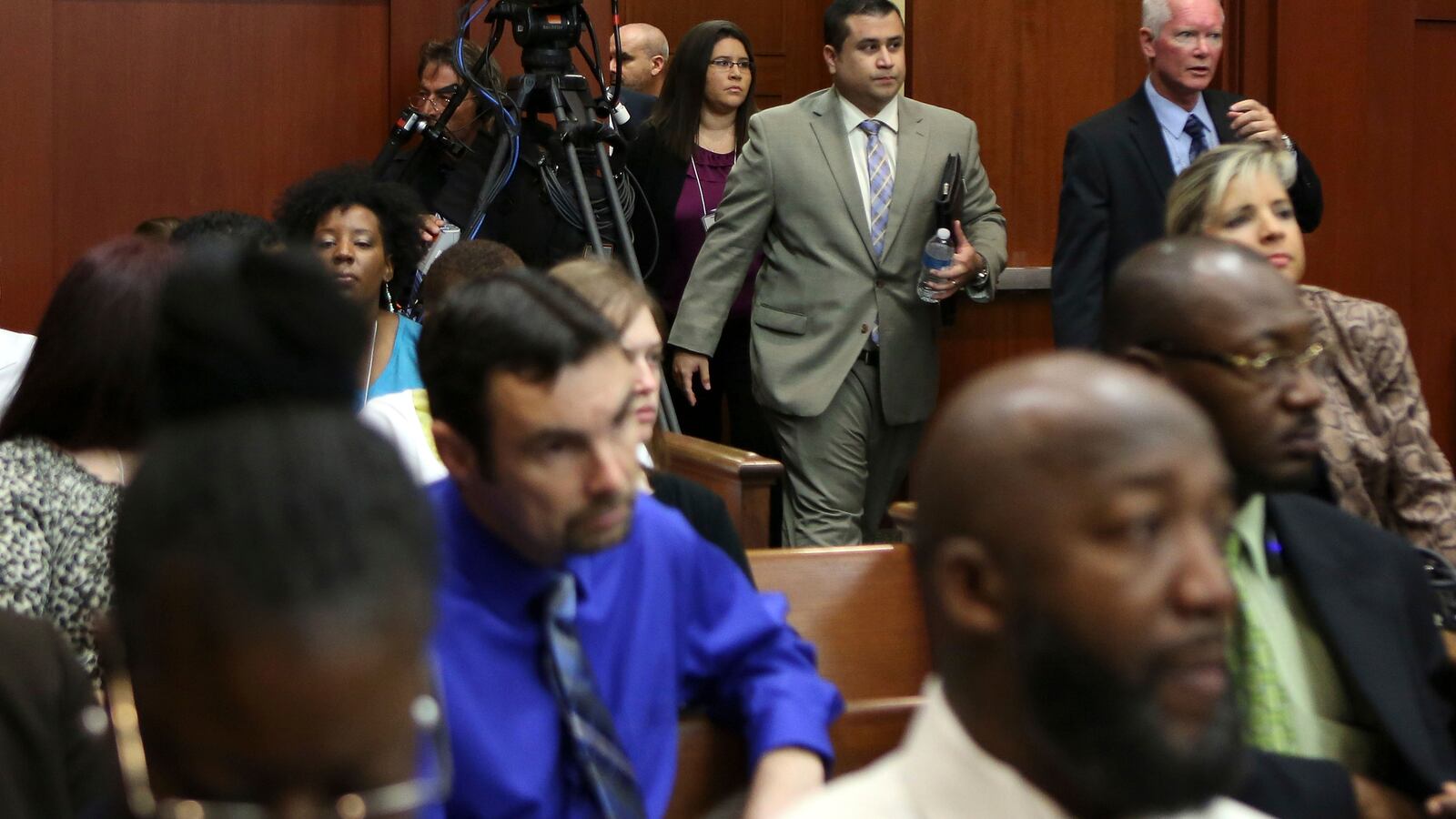Trayvon Martin’s parents weren’t in the Sanford, Florida, courtroom last night to hear the verdict that they more than likely always saw coming. Not guilty. The trial for the man who’d killed their 17-year-old son, George Zimmerman, was held in the very city that decided Zimmerman didn’t warrant being arrested in the first place after shooting an unarmed high school student. The Martin family knew the cards were heavily stacked against them.

Still, throughout the trial I was struck by how stoic and steadfast Tracy Martin and Sybrina Fulton—the parents of Trayvon—appeared as they sat listening to testimony that basically accused their dead son of causing of his own murder.
As I watched the unbelievable turn of events in court unfold, my thoughts often turned to another set of parents who’d faced the same tragic set of circumstances, but with a very different ending.
Bill and Camille Cosby’s 27-year-old son, Ennis, was shot and killed just off a California freeway in the early morning hours of January 16, 1997. A few weeks later, I was able to sit down with Mr. Cosby, and it appeared that the man who had made us laugh for decades was dealing with his loss with an amazing amount of strength and grace. He sensed my hesitation to ask about Ennis, so he began to talk about his son without my prompting. He said that the person who’d murdered Ennis “was now riding with the devil.’’ That person had yet to be arrested.
Five years later I would sit down with Cosby again in his New York City brownstone, a breathtakingly beautiful home heavily accented throughout with loving memories of his only son. The man who greeted me that day was quite different from the one I’d met in the weeks after Ennis’s death. Nineteen-year-old Mikhail Markhasev had been convicted for the first-degree murder of Ennis and sentenced to life in prison plus 10 years without parole. The Cosby family had requested that the death penalty not be considered. Still, the toll of the murder trial and the gravity of his loss were now very apparent on the comic’s face.
We spoke about a variety of issues as we walked through his home’s many floors and rooms, decorated with Cosby’s incredible collection of African art and oil paintings of nonblack subjects drawn by black slaves during the 1800s. By far the most impressive piece of art was the bronze bust of Ennis in the foyer. Cosby referenced the bust several times that day, even lovingly speaking to it after a friend of his son’s called to say he passed his bar exam.
As we wrapped up our interview, Cosby paused and took a seat on the steps of his winding staircase. He wanted to share one last important thought. He said that he’d traveled from New York to California regularly so that he could be in the courtroom as often as possible during the trial of his son’s murderer. He said he knew he had to be there for the jurors to really see him. He knew he had to be there, “because someone had to pay for the death of his son.’’
That day Cosby let me know that he understood full well the tremendous advantage that his fame and fortune afforded him. He was powerful. He knew he wasn’t the average African-American man in the eyes of mainstream America. In their eyes he was a famous, exceptionally talented, and extremely rich African-American man. That made all the difference in the world.

For those who feel the name O.J. Simpson fits this same scenario, be clear that he doesn’t. Simpson’s controversial trial in Los Angeles came on the heels of several highly visible criminal cases where those responsible for killing African-American teenager LaTasha Harlins and beating Rodney King were found not guilty despite compelling evidence against them (videos in both cases of the crimes). Simpson simply benefited from the long-simmering anger felt by a helpless black community.
Cosby’s presence in the courtroom came across as that of a longtime friend, pleasantly familiar and trustworthy to all, now suffering the unimaginable death of a beloved child at the hands of another. Someone needed to be punished for the murder of the TV icon’s son. Someone most certainly did.
The names of Sybrina Fulton and Tracy Martin were unknown to all of us before last February. Their faces only recognizable in recent months from interviews filed after Trayvon’s death. Still, they prayed for justice in the murder of their son, a teenager walking home from the corner store with Skittles and iced tea in one hand and a cellphone to his ear in the other. The son who George Zimmerman assumed was on his way to commit a crime, so he called the police. What happened next will likely forever be up for debate. But the fact that an unarmed high school student was shot to death that night and the man responsible set free will not.
Some may argue the basic circumstances of Ennis Cosby’s murder and Trayvon Martin’s death are not the same. Cosby was innocently changing his tire that night when he was robbed at gunpoint and then shot in the head. But I would argue that Trayvon Martin was innocently heading home from the store that night when an overzealous neighborhood watchman decided that a black teenager simply running to avoid the rain wasn’t worthy of being given the benefit of the doubt.
Cosby knew his appearances in a California courtroom more than a decade ago would go a long way in ensuring justice for his murdered son. Today, Sybrina Fulton and Tracy Martin know that theirs did not.






